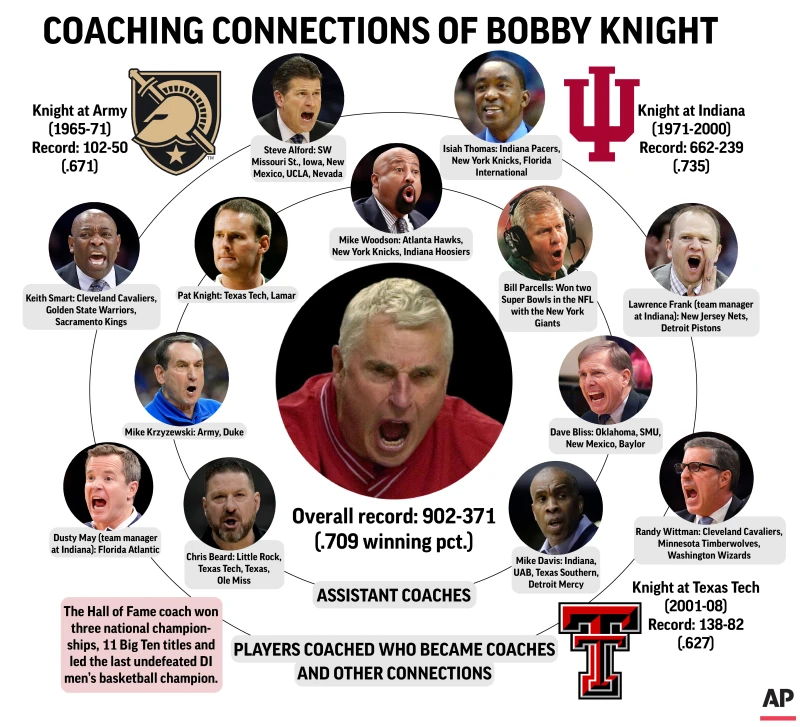BLOOMFIELD, Ind. – Bob Knight, the brilliant and volatile coach who won three NCAA championships at Indiana and was the scowling face of collegiate basketball for many years, has died. He was 83.
On Wednesday night, Knight’s family made the revelation on social media. He was hospitalized in April due to an illness and had been in poor health for several years.
“It is with heavy hearts that we share that Coach Bob Knight passed away at his home in Bloomington surrounded by his family,” the statement said. “We are grateful for all the thoughts and prayers and appreciate the continued respect for our privacy as Coach requested a private family gathering, which is being honored.”
Knight was one of the sport’s most successful and divisive coaches, concluding his career with 902 victories in 42 seasons at Army, Indiana, and Texas Tech while training some of America’s top coaches. He also coached the United States Olympic team to gold in 1984.
The Hall of Famer didn’t care what others thought of him and chose Frank Sinatra’s “My Way” to celebrate his 880th win in 2007, which was then a Division I men’s basketball record.
He was dubbed “The General,” and his fiery temper cost him his job in Indiana in 2000. He was accused of hitting a police officer in Puerto Rico, throwing a chair across the court, and wrapping his hands around a player’s neck.
His actions were widely condemned, but his supporters were numerous. There was another side to Knight: he was proud of his players’ great graduation rates, and even during a rule-breaking era, he was never accused of a serious NCAA violation.
He insisted at Indiana that his base wage not be higher than that of other academics. He used to give up his salary at Texas Tech because he didn’t believe he deserved it.
Bob Knight, Indiana’s Combustible Coaching Giant, Dies At Age 83
On and off the court, Knight expected his players to outperform their peers. He followed NCAA standards even when he disagreed with them, never backed down from a fight, and swore to take his old-school values to the grave.
While many of his players adored him, his demeanor and antics occasionally masked his tremendous record, tactical understanding, invention, and passion for the game, leaving behind a one-of-a-kind resume.
“He changed basketball in this state, the way you compete, the way you win,” said Steve Alford, the coach of Knight’s final national championship squad in 1987. “It started in Indiana, but he changed college basketball forever.” Look at the motion offense; it was employed everywhere.”
Long admired his approach and frequently questioned his methods. Knight delighted in building his best teams with overachievers. He adhered to iron beliefs as a difficult-to-please motivator, and at 6-foot-5, he was an imposing figure for anyone who dared to cross him.
Knight retired in 2008 with four national championships (one as a player at Ohio State) and the Division I men’s win record. From Mike Krzyzewski to Isiah Thomas to Michael Jordan, he coached them all. Among others in his coaching tree wered Krzyzewski, who shattered Knight’s win record; Alford; Lawrence Frank, Keith Smart, Randy Wittman, and Mike Woodson, Indiana’s current coach.
Bob Knight, Indiana’s Combustible Coaching Giant, Dies At Age 83
“We lost one of the greatest coaches in the history of basketball today,” Krzyzewski said in a statement. “He was clearly one of a kind. He hired me, coached me, mentored me, and had a significant impact on my career and life. This is a huge loss for our sport, and our family is devastated.”
Robert Montgomery Knight was born in Massillon, Ohio, on October 25, 1940. His mother was a schoolteacher, and his father worked for the railway, which Knight cited as his early influence.
Hazel Knight appeared to grasp her son’s personality. When Indiana was scheduled to play Kentucky on television, two of Knight’s high school classmates approached her in a grocery store and inquired if she was enthusiastic about the game, according to his memoir, “Knight: My Story.”
“I just hope he behaves,” said his mother.
He attended Ohio State and was a reserve on three Final Four teams (1960-62). He was a member of the 1960 championship team that included future Hall of Famers Jerry Lucas and John Havlicek.
Knight joined the Tates Locke staff at West Point after a year as a high school assistant. At 24, he took over as head coach in 1965. His teams won 102 games in six seasons, coaching the likes of Krzyzewski and Mike Silliman, and he was off to Indiana in 1971.
Knight swiftly revived the Hoosiers’ basketball tradition with a novel offense and a defense that was almost entirely man-to-man. Most opponents struggled against his early Indiana teams, which went 125-20 and won four Big Ten Conference championships in his first five seasons.
Bob Knight, Indiana’s Combustible Coaching Giant, Dies At Age 83
Indiana won their first national championship in 23 years at the end of the run. That 32-0 club in 1975-76 ended a two-year streak in which the Hoosiers were 63-1 and won back-to-back Big Ten championships with 18-0 records. It is still the last time a major collegiate men’s team finished undefeated. In 2013, the US Basketball Writers Association named that team the greatest in college basketball history.
“One of the things he said to our 1976 team, which I was fortunate enough to be a part of, was that you may never see another team like this again,” said Quinn Buckner, chair of the Indiana Board of Trustees. “Well, I don’t know that we will ever see another coach like him again.”
Knight won his second championship in 1981, defeating Dean Smith’s North Carolina team after NCAA officials opted to play the game hours after President Ronald Reagan was shot and injured earlier that day. Smart won his third title at Indiana in 1987, when he beat Syracuse with a baseline jumper in the last seconds, one of the most iconic shots in tournament history.
Knight also appeared in Adam Sandler’s 2003 film “Anger Management” as a cameo. In 2006, he appeared on ESPN’s “Knight School,” a reality show where 16 Texas Tech students competed to walk on to his squad the following season.
Knight, who frequently yelled at reporters, joined ESPN as a guest studio commentator during the 2008 NCAA Tournament a month after leaving Tech. He expanded his job as a color commentator the following season. Knight left the network in 2015.
He returned to public prominence in 2016, campaigning for Republican presidential candidate Donald Trump, and maintained a fairly low profile until returning to the school where he became a household name and the state where his death was revealed in retail stores Wednesday night.
“I was standing there, and he was coach Knight,” Wittman recalled Knight’s pregame speech in February 2020. “It was as if he had never left that locker room.” His comments to the players before they stepped out on the pitch were fantastic.”
Karen, his wife, and their sons Tim and Pat are survivors.
SOURCE – (AP)









